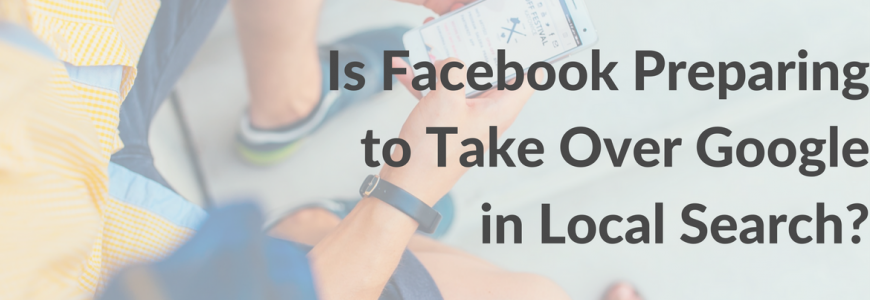We’ve lightly joked before that Facebook is the new Google. This is mainly because Facebook users are asking their social network for recommendations of local businesses rather than conducting their own searches on Google. However, as Wesley Young wrote in a recent article on Search Engine Land, Facebook has made several updates over the past couple of years that point to a greater focus on local businesses and places. In other words, it looks like Facebook is preparing to challenge Google’s monopoly on local search.
We’re all aware that Google uses a massive amount of data from its users to hone its algorithms and laser-target search results for each user. However, Facebook has a comparable volume of data:
With its huge base of users and volume of personal data on them, Facebook has great potential for helping users in their search for local products/services and helping businesses get found. All the components are there: millions of business pages, location data, behavior data, demographic information, social networks and engagement.
In other words, Facebook already has a tremendous amount of potential to compete with Google in the local search sphere.
Here’s a quick breakdown of how Young says Facebook is making moves toward a bigger emphasis on local search. We’ve reduced and simplified many of Young’s points, so please check out his full article, “7 Changes by Facebook That Make It a Real Local Search Player,” for more details. It’s an in-depth, insightful piece that’s definitely worth the read!
1. Better Location Accuracy
Young uses the example of his search for nearby Italian restaurants. He compares results from November 2015 and June 2017 (present). In 2015, Facebook search displayed restaurants from across the country and across the globe. Today, Facebook search displays restaurants within a two-mile radius and even arranges them on a local map, much like Google’s local search results.
2. Smarter Understanding of Search Terms
Facebook is now able to infer when a user is searching for a place or business rather than a general topic. It also presents “Places” listings at the top of the general search results whenever a place is relevant. At the same time, Facebook knows when you’re searching for a discussion topic or news item, instead. So it’s gotten much more adept at deciphering the context and motivation behind search terms.
3. More Detailed Search Results
Instead of barely relevant or minimally informative, Facebook business listings now offer as much detail as most Google business listings. They show profile pictures, full contact information, distance from the user, star rating, and whether the business is still open for the day. In other words, Facebook’s local listings give you all the same information you’d seek on Google.
4. Better Recall of Information
Facebook now keeps track of and remembers information about businesses and places that users have posted about or checked into. Not only does this lead to more accurate search results, but it also gives Facebook the ability to suggest search terms while a user is typing, much like Google does.
5. Use of Facebook Friends Within Search Results
Wisely, Facebook is using its mountains of social data to supplement local search listings. Now, Facebook Places listings may show you which of your friends have also checked in or posted about each business. Considering that many users already ask their Facebook friends for recommendations and referrals, this addition is brilliant. It’s essentially a built-in recommendation.
6. Greater Effort to Clean Up Business Info
If you checked in to a local place or business recently, you may have been confronted with a series of follow-up questions from Facebook—questions like, “Are this business’s hours from 8 AM to 9 PM?” or “Is this business located at 12 Main St.?” Facebook has been asking users to verify local business information in order to deliver more accurate results overall.
7. Addition of New “City Guides”
Facebook has a new feature that compiles and highlights popular spots in a specified city, based on its own social data. It will tell you which of your friends have visited that city, and then you can see which businesses each of those friends checked into. Again, this takes the idea of asking friends for recommendations and turns it into a local search feature.
So, what’s the takeaway for your local business? Make sure your Facebook page is completely filled out (including your exact physical location) and that you add as much detail as possible to your service descriptions. This will give you a greater chance of being picked up by Facebook’s ever-improving search function.
Good luck!



